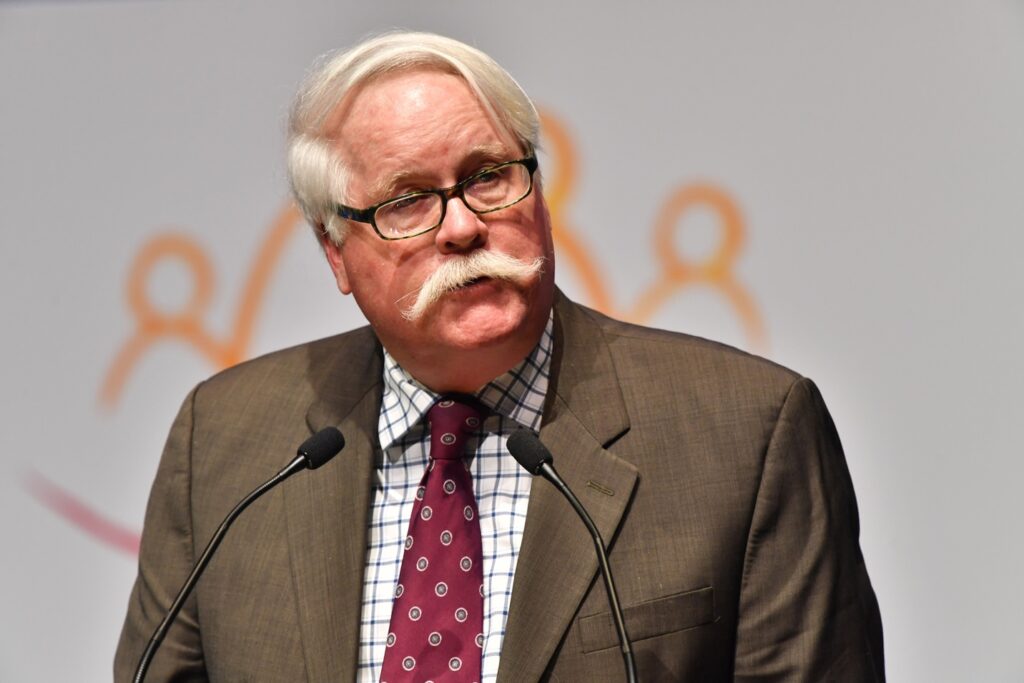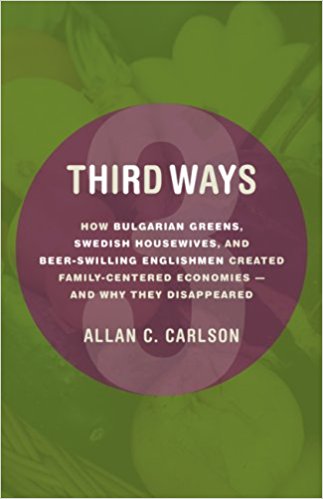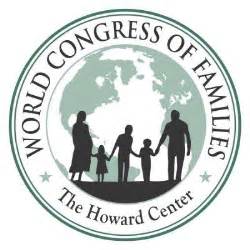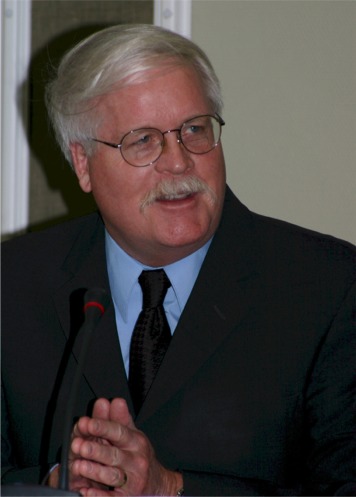
The Howard Center’s retired president defends an overlooked school of economic thought. Authored by Dr. Allan Carlson, Third Ways cites case studies from European countries and emphasizes little-known economists. He is a history professor at Hillsdale College.
Ever since America’s founding, a commitment to freedom has fueled a prosperous outcome. An enterprising spirit resulted in vast wealth never before seen. But twentieth-century government involvement, dating back to the Progressive antitrust laws, New Deal, and Great Society programs, fashioned a quasi-social-democratic norm. How would you describe our economic situation today?
Our current economic situation moves toward a form of polarization which Hilaire Belloc called The Servile State. While the middle class shrinks, American society is dividing into two classes: a relatively small number of free citizens who own most productive property and financial instruments and a dispossessed majority who are masters only of their own labor and have no control over capital or land. Many of the latter, though, are quite content in their servility. Instead of the risks and responsibilities that go with property ownership, they are content to receive a modest wage income, gain access to cheap consumer goods, and claim state welfare benefits as their security blanket. The parameters of this system grew particularly apparent during the financial crisis of 2007-08, which exposed the reality and perils of the Servile State among us.
You write about a so-called “third way” which sits somewhere between an unfettered market economy and a command-control system. Communism failed miserably, as the murderous Soviet experiment, along with many others, proves. In your view where does the Western understanding of capitalism fall short?
Quite simply, the capitalist marketplace is not self-regulating. As in all times, great accumulations of wealth buy political power and shape public policy to protect and enhance their privileges.
The dominant current reality is not a free-market, but crony capitalism. This is why millions of Americans lost their homes in the 2007-08 economic crisis, while none of the bankers or regulators who had created this fraudulent system paid any legal price, and most of the great firms (with their swollen executive compensation packages) were bailed out. All the same, the American system has at times worked well within a regime of proper controls. Between 1945 and 1975, for example, existing taxation and regulatory policies produced extraordinary results: economic inequality between households declined; the middle class grew dramatically; and Americans were transformed from a nation of renters into a nation of homeowners.

From education to welfare policy, Washington politicians and bureaucrats often dictate orders to American citizens. Traditionalists prefer a much smaller executive branch; Third Ways seemingly supports a mixed model. Are there reforms that you welcome?
Some ideas: Income tax policy should favor families raising children; the existing child deduction and child credit should be at least doubled and existing limits on eligibility eliminated. Overall tax rates should be raised to cover this revenue decrease. The Social Security system should also be adjusted to favor parents who have raised children, either by reducing their payroll tax according to family size or raising their retirement benefits in a similar way. Farm policy, including subsides, should favor family scale agriculture, not agribusiness. Educational policy should protect home schools, private schools, and religious schools. Public elementary and secondary schools should be radically decentralized, with a separate governing board for each school; and complete local control over curricula and the hiring of teachers. They would operate as do community colleges, open to all, compelling none. Health insurance companies should be allowed to take family structure into account when setting premiums. Individuals should be held legally accountable for corporate fraud and theft.
A thriving society relies on a robust familial structure. Surveying the composition of populous U.S. cities reveals an unsustainable trend: single-parent families. Homes boasting two parents, though, often contain an employed father and mother. To promote the family unit’s revival, what should individuals do?
In terms of some policies, see my answers immediately above. Relative to working parents and child care, a family with a parent providing full-time child care at home (through age 5) should receive a tax credit equivalent to that received by families using substitute day care. Employers should be allowed to pay a “family wage” to heads of households, if they so choose. More broadly, young people setting out in life should realize that marrying and raising a bunch of children is in fact the new counter-culture and revolutionary in the most profound way. Thumb your noses at the current establishment, follow your best instincts, and join the family revolution; the future will be yours. In addition: (a) Treasure private property as the foundation of a free society; (b) Understand that the central social and political challenge is to keep competition and the quest for efficiency out of the family and the local community, and at the same time to keep altruism out of central governments; (c) Defend the natural family economy through appeals to human biology and human history; (d) Place primary faith in cultural affirmations and defenses, and only secondary trust in state actions; (e) Infuse religious energy into culture, politics, and economic life as the surest source of renewal; and (f), build on small acts.

Bulgarians, Swedes, and the English are referenced in your subtitle. Eurocentric examples abound! Why did agrarianism and distributism – namely fortified property ownership, self-sustaining labor – essentially vanish?
Most of the projects described here flourished during the 1920-40 period, and failed because of the relative decency of Third Way advocates in the face of fascists, socialists, communists, and militarists who scorned democracy and who used violence to achieve their ends. These Third Way advocates faced a common dilemma: In the face of coercive violence, do we hold to our non-violent, democratic ideals? Or do we bend democracy and abandon non-violence in order to save both in the long run? No easy answers here, I’m afraid.
Learn more about Allan Carlson
- Wikipedia page
- C-SPAN appearances
- The Independent Institute biography
- Front Porch Republic archive of articles
- Hillsdale Collegian news story – “Carlson speaks on hope for the future American family”

Books (select)
- Third Ways: How Bulgarian Greens, Swedish Housewives, and Beer-Swilling Englishmen Created Family-Centered Economies – And Why They Disappeared
- The American Way: Family and Community in the Shaping Of American Identity
- From Cottage to Work Station: The Family’s Search for Social Harmony in the Industrial Age
- Godly Seed: American Evangelicals Confront Birth Control, 1873-1973
- The Natural Family: A Manifesto
- Family Questions: Reflections on the American Social Crisis
- Fractured Generations: Crafting a Family Policy for Twenty-First-Century America
Dr. Allan Carlson is president emeritus of the Howard Center, a history professor at Hillsdale College, and an author.
Want to hear a different perspective on economics? See our interviews with Nobel Laureate economist Vernon L. Smith and the retired Foundation for Economic Education president Lawrence Reed.